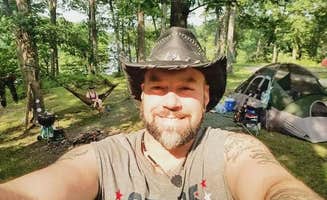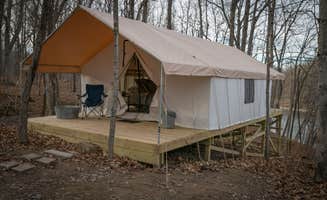Tent camping near Ashland, Illinois centers primarily around small lakes and wildlife areas within a 30-mile radius of town. The region features predominantly flat terrain with scattered wooded areas and modest water features. Summer camping conditions regularly reach 80-90°F with high humidity, while spring and fall offer milder temperatures but increased precipitation risk. Most camping facilities maintain primitive standards with limited infrastructure.
What to do
**Fishing opportunities: Waverly Lake City Park offers both bank fishing and boat access for anglers. "I've stayed here a couple times now. Each time there has only been one other person. It's quiet and peaceful, however there's not much to do," notes camper John H.
**Wildlife observation: Early mornings provide optimal wildlife viewing conditions throughout the camping areas. Expect to encounter various bird species, deer, raccoons, and small mammals. According to one camper at Spring Lake State Fish and Wildlife Area, "Deer run hiking trail is right in camp and gets you a bit of a hike."
**Photography sessions: Morning fog over the lakes creates atmospheric conditions for landscape photography. Bring waterproof gear during spring months when morning dew is heaviest. The open fields and lake shorelines offer unobstructed views for sunset captures.
What campers like
Privacy between sites: Campers appreciate the spacing at smaller campgrounds. At Waverly Lake City Park, one visitor mentioned, "We had a pleasant and fairly private experience. Each site is spread out and fairly well." This spacing provides a more secluded camping experience despite being in established areas.
Quiet atmosphere: The lack of crowds contributes to peaceful camping experiences throughout the region. "My wife and I really enjoy this campsite," states a Waverly Lake visitor, highlighting the tranquil setting common to many Ashland area camping locations.
Accessibility to fishing: Hidden Ridge offers boat-in tent camping options for serious anglers seeking direct water access. The site provides fire rings and picnic tables at each designated camping location, allowing campers to prepare their catch on-site.
What you should know
Limited facilities: Most tent sites near Ashland operate with minimal amenities. "As far as I know there's no running water. There are portable toilets that are kept clean. There's also a 4 consecutive day per month limit," explains a camper at Waverly Lake, reflecting the common limitations throughout the area.
Insect preparation: Bug protection represents a critical packing consideration. "Be mindful of field roaches and raccoons at night, as we had to learn the hard way the morning after our first night. Oh, and the mosquitoes are BRUTAL. Come prepared," warns one Waverly Lake camper.
Reservation systems: Most camping locations operate on first-come, first-served basis without formal reservation processes. Weekday arrivals improve site selection chances, particularly during summer months when visitor numbers increase slightly.
Tips for camping with families
Pack extra water: Since many sites lack running water, families should calculate 1.5 gallons per person per day minimum. Edward Madigan State Fish and Wildlife Area has no drinking water sources on site. "Would take my family back!" notes one visitor, though preparation remains essential.
Plan for bathroom limitations: Most locations feature vault toilets or portable facilities without shower access. Bring solar shower bags and privacy tents for extended stays, especially during summer months when temperatures regularly exceed 85°F.
Create structured activities: The open settings require parents to plan engagement opportunities. Bring field identification guides, binoculars, and scavenger hunt lists to maintain children's interest in the natural surroundings.
Tips from RVers
Limited hookup availability: Most camping areas near Ashland lack electrical, water, or sewer connections for RVs. Prepare for dry camping with fully charged batteries and filled freshwater tanks. Generator usage policies vary by location.
Access road considerations: Rainey Park offers paved parking areas suitable for smaller RVs and vans. "This is a paved lot past the ballfields. Pull in at the sign and follow the road," notes Barbara P., though she cautions, "No tent camping allowed."
Road quality awareness: Spring Lake requires navigating narrow, winding access routes. "Be ready for a long slow drive in to the campground. Follow signs that direct you to the camp office. That's where the camping is," advises a visitor, reflecting the typical rural road conditions throughout the region.



